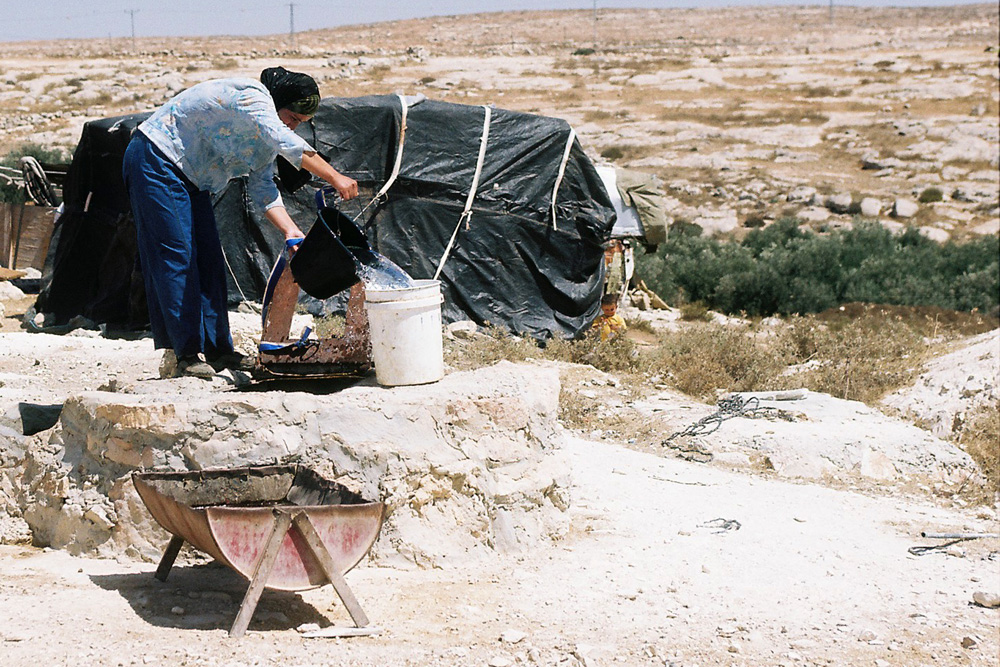[Read this story in Arabic]
The settlements disconnect Palestinians from agricultural land and limit their movement, restricting access to markets and water resources, the report, entitled The Humanitarian Impact of Israeli Infrastructure in the West Bank, said.
In the southern Hebron Hills area a conflict between Israeli settlers and Palestinians over land and water resources is apparent. Palestinian residents in interviews with IRIN described the harsh impact the settlements have on their daily lives.
Water
In the small village of Um al Khir, near the Carmel settlement, the residents receive water through an old military above-ground network of thin pipes which, they say, does not meet their needs and which they cannot refurbish. They supplement this with expensive water brought in by tankers. The Israeli settlers are connected to the mains network. "The settlers' chicken huts have running water and electricity," Sheikh Khalil Hathallia, a resident, told IRIN.
 Photo: Shabtai Gold/IRIN  |
| Water containers used by the villagers in Um al Khir. Carmel settlement can be seen in the background |
Furthermore, the report states, West Bank Palestinian water consumption per person is considerably lower than standards set by the World Health Organization.
Shlomo Dror, a spokesman for the Israeli Ministry of Defence, said that according to the Oslo Accords, Israel was required to increase the amount of water allocated to the Palestinians by three percent each year.
"In fact, in the last year, for example, we increased the allocation by eight percent," he said.
He also said the Palestinians needed to invest in water purification systems to maximize the use of the water they do have.
Slow shrinking of grazing areas
However, for the villagers in Um al Khir, the fight over resources has led to house demolitions and a slow shrinking of grazing and agricultural areas.
"Now it costs us much more. We need to buy fodder instead of grazing our animals," said Hathallia, noting the growing size of the Israeli settlement.
His neighbour and fellow tribesman, Sliman Hathallia, said his land had been taken in recent years by settlers. He pointed out their new homes. "By 2006, they had totally grabbed all the [my] land," he said.
 Photo: Shabtai Gold/IRIN  |
| A Palestinian girl returns home to Um al Khir from school. Many students study by the light of the neighbouring settlement as they lack electricity |
"My wife was injured by the army while they demolished homes here last February," he said, producing medical documents appearing to indicate she now suffered from heart problems and had had a nervous breakdown due to the stress caused.
The homes were destroyed for not having permits from the Israeli Civil Administration.
Similarly, the UN Development Programme (UNDP) set up generators in the village, but the Palestinians were not allowed to install the network which would allow the electricity to be distributed to their homes.
"I won't leave here. If they want me to move, I'll do it, but only if I can go back to Tel Arad," Sliman said, referring to the village where he was born in what is now Israel.
All of the residents of Um al Khir are refugees from the 1948 war, registered with UNRWA, the UN agency for Palestinian refugees.
Susya village
A similar situation exists in Susya, a small Palestinian village further south.
All the residents are internally displaced persons (IDPs). In 1985, the Israeli authorities declared their land an archaeological zone, and they had to move to nearby land. They now say settlers are trying to squeeze them out of their new village.
 Photo: Shabtai Gold/IRIN  |
|
"We had to buy back our water from the [Israeli] settlement. We can't access our land near the settlements. Then the settlers come and work the land. They are trying to take it over and the army doesn't stop them." |
|
Muhammed Nawaja from Susya |
Water here becomes a precious commodity between the months of July and October, when the cisterns, filled by rainwater, run low. Residents say settler security forces keep them from accessing many of their wells and then use the water for themselves.
"We had to buy back our water from the [Israeli] settlement," Muhammed Nawaja, a resident, said with a sigh.
"We can't access our land near the settlements. Then the settlers come and work the land. They are trying to take it over and the army doesn't stop them."
Dror, who admits there is an ongoing conflict over land, said Israel cracks down on illegal acts by settlers and does not distinguish between Jews and Palestinians. "And the Palestinians always have the option of going to the Israeli High Court to contest land claims," he said.
Recently, the court ordered the state to dismantle an 80cm-high wall in the area which had prevented Palestinians from accessing grazing land.
"That whole story, which we said was illegal, led to a waste of about US$20 million," said a UN aid worker who preferred anonymity, noting how that money could have helped poor Palestinians.
Israel, as opposed to the international community, does not view its settlements as a violation of the Fourth Geneva Convention as it maintains the West Bank is not occupied land.
shg/ar/cb
This article was produced by IRIN News while it was part of the United Nations Office for the Coordination of Humanitarian Affairs. Please send queries on copyright or liability to the UN. For more information: https://shop.un.org/rights-permissions





